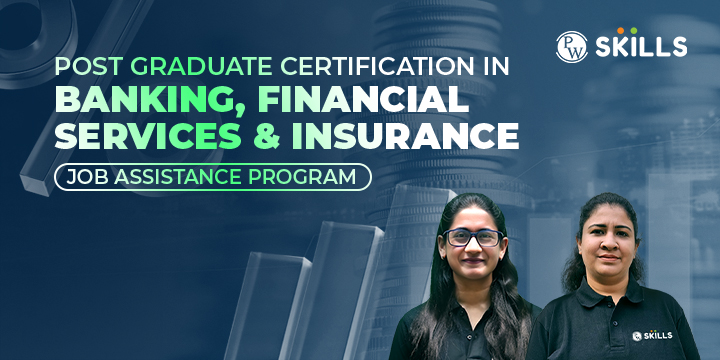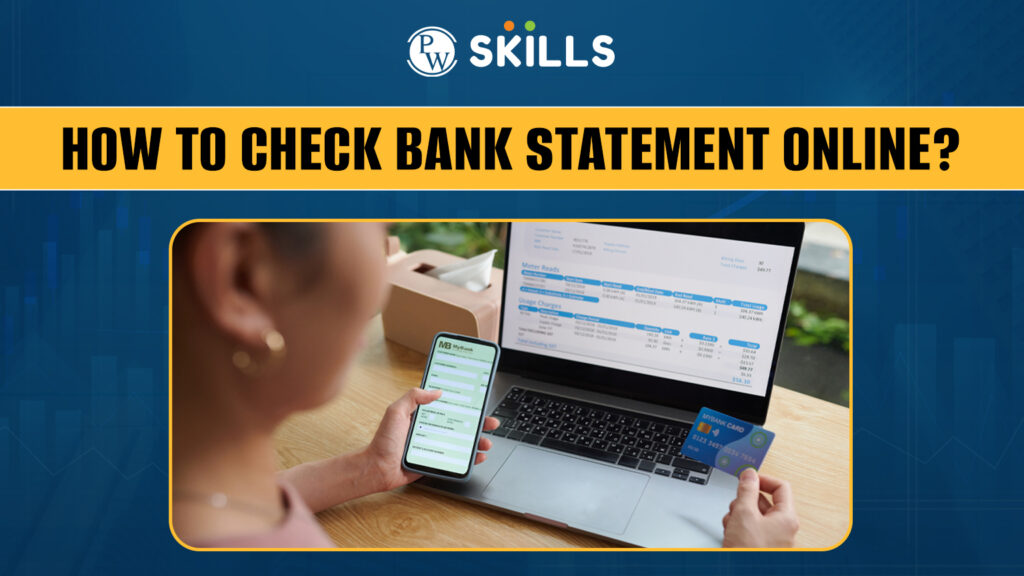Private Bank Job Recruitment: To secure a coveted position in a private bank, consider enrolling in the BFSI (Banking, Financial Services, and Insurance) course offered by Physics Wallah.
This comprehensive course provides access to a wealth of resources, including instructional videos, live classes, domain & soft skills training, interview preparation, video assignments, and quizzes, all designed to prepare you for private bank jobs with 100% placement assistance.
Upon successful completion of the course, you’ll receive a certification, along with a significant 53% discount.
Private Bank Job Recruitment Overview
A position in a private bank entails providing exceptional financial services and products tailored to the needs of clients. Whether individuals are affluent or not, they can open accounts and manage their finances with ease. Private banks often cater to high-net-worth individuals who possess significant liquid assets that can be readily converted into cash.
The recruitment process in private banks usually starts with the identification of job vacancies based on the bank’s staffing needs. This may include positions such as relationship managers, investment advisors, loan officers, customer service representatives, and administrative staff.
Once job vacancies are identified, private banks typically advertise these positions through various channels such as online job portals, newspaper advertisements, recruitment agencies, and the bank’s own career website. Interested candidates are then invited to apply for the positions by submitting their resumes or CVs along with any required application materials.
After receiving applications, private banks may conduct a series of selection stages, including screening of applications, written tests, interviews, and assessments.
Successful candidates who pass the selection stages are offered employment contracts and may undergo further training or orientation programs before officially joining the private bank.
Also Read: Private Bank Job Recruitment in 2024 You Can’t Miss
Private Bank Job Recruitment in India
Private bank job recruitment in India is a competitive process that attracts a large number of applicants seeking opportunities in the banking sector. Private banks in India, such as HDFC Bank, ICICI Bank, Axis Bank, Kotak Mahindra Bank, and others, regularly announce job openings across various positions to meet their staffing needs and expand their operations.
These job opportunities span across roles such as sales executive, microfinance executives, customer service executives, relationship executives, investment bankers, and more.
Private banks typically follow a structured recruitment process that involves several stages, including online application submission, screening of applications, aptitude tests or written examinations, group discussions, personal interviews, and final selection. The selection process may vary depending on the position and the bank’s specific requirements.
Candidates interested in private bank job recruitment in India should regularly check the career sections of bank websites, job portals, and employment newspapers for job openings. It’s essential to carefully review job descriptions, eligibility criteria, and application deadlines before applying for any position.
To increase their chances of success in private bank job recruitment, candidates should focus on developing relevant skills, gaining industry knowledge, and preparing thoroughly for selection tests and interviews.
Networking with professionals in the banking sector, seeking referrals, and obtaining certifications with placement assistance or qualifications related to banking and finance can also enhance job prospects.
Overall, private bank job recruitment in India offers promising career opportunities for individuals aspiring to work in the dynamic and fast-paced banking industry, with the potential for growth, learning, and professional development.
Jobs in Private Banks for Freshers
Jobs in private banks for freshers offer promising career opportunities for individuals who are just starting their professional journey in the banking sector. Private banks regularly recruit fresh graduates across various entry-level positions to build a talented workforce and groom them for future leadership roles. Some common entry-level positions in private banks for freshers include:
1) Customer Service Executive:
Customer service executives are responsible for assisting customers with their banking inquiries, resolving complaints, and providing information about banking products and services. They play a crucial role in ensuring customer satisfaction and retention.
2) Relationship Manager (RM):
Relationship managers are tasked with building and maintaining relationships with high net worth individuals (HNIs) or corporate clients. They offer personalized financial advice, recommend suitable investment products, and help clients achieve their financial goals.
3) Sales Executive:
Sales executives focus on promoting banking products such as savings accounts, credit cards, loans, and insurance policies to prospective customers. They may work in branches, call centers, or engage in field sales activities to meet sales targets.
4) Assistant Manager:
Assistant managers support senior managers in overseeing day-to-day banking operations, supervising staff, and implementing organizational policies and procedures. They may also assist in conducting audits, analyzing financial data, and preparing reports.
5) Operations Assistant:
Operations assistants are responsible for supporting various operational activities within the bank, such as account opening, transaction processing, cash management, and reconciliation. They ensure that operational tasks are carried out efficiently and accurately to meet regulatory requirements and customer expectations.
6) Credit Analyst:
Credit analysts evaluate the creditworthiness of individuals or businesses applying for loans or credit facilities from the bank. They analyze financial statements, assess risk factors, and make recommendations on whether to approve or deny credit applications. Strong analytical skills and attention to detail are crucial for this role.
7) Investment Analyst:
Investment analysts conduct research and analysis on financial markets, investment products, and economic trends to support investment decision-making. They provide recommendations on asset allocation, portfolio management, and investment strategies based on their findings. A background in finance, economics, or investment management is typically required for this role.
8) Treasury Officer:
Treasury officers manage the bank’s liquidity, cash flow, and investment activities to optimize financial performance and mitigate risks. They monitor market conditions, execute trades, and maintain relationships with counterparties such as other banks and financial institutions. A strong understanding of financial markets and risk management principles is essential for this role.
9) Digital Banking Specialist:
With the increasing emphasis on digitalization in the banking industry, there is a growing demand for professionals who specialize in digital banking initiatives. Digital banking specialists develop and implement digital solutions such as mobile banking apps, online account opening platforms, and digital payment systems to enhance the customer experience and drive innovation.
10) Compliance Officer:
Compliance officers ensure that the bank operates in compliance with applicable laws, regulations, and internal policies to prevent financial crimes, such as money laundering and fraud. They conduct risk assessments, develop compliance programs, and provide training to staff on regulatory requirements. A background in law, finance, or compliance is typically required for this role.
11) Human Resources Assistant:
Human resources assistants support the bank’s HR department in various functions, including recruitment, employee onboarding, training and development, performance management, and employee relations. They assist in coordinating HR activities and maintaining employee records to ensure compliance with HR policies and procedures.
To secure a job in a private bank as a fresher, candidates should possess a bachelor’s degree in any field however in finance, business administration, economics, or a related field from a recognized university will be an added advantage. Strong communication skills, customer service orientation, analytical abilities, and a willingness to learn are essential qualities sought by employers.
Freshers can explore job opportunities in private banks by regularly checking the career sections of bank websites, attending campus recruitment drives, participating in job fairs, and networking with professionals in the banking industry. Additionally, candidates may consider internships or training programs offered by private banks to gain hands-on experience and increase their employability.
Also Read: List Of Top 10 Bank Jobs After Graduation, Apply Now 2024
Private Bank Job Recruitment – Step By Step Guide
Achieving success in private bank job recruitment requires thorough preparation and strategic planning. Here is a step-by-step tutorial to help you go through the process effectively:
Step 1: Research and Identify Opportunities:
- Start by researching private banks in your area or preferred location.
- Visit their official websites and explore their career sections to identify job openings.
- Look for positions that are suitable for your skills, qualifications & career goals.
Step 2: Assess Your Skills and Qualifications:
- Evaluate your skills, experience, and qualifications in relation to the job requirements.
- Identify areas where you excel and areas that may require improvement or further development.
- Consider obtaining additional certifications or training to enhance your qualifications if needed.
Step 3: Create Your Resume and Cover Letter:
- Edit your resume and cover letter to show your relevant skills and experiences in a specific industry.
- Clearly articulate how your background aligns with the job requirements and the bank’s mission and values.
- Use main keywords from the job description to manage your resume for applicant tracking systems (ATS).
Step 4: Network and Seek Referrals:
- Leverage your professional network to explore potential job opportunities in private banks.
- Reach out to contacts within the industry for advice, insights, and referrals.
- Go to networking events, career fairs, & industry related conferences to expand your network.
Step 5: Prepare for Interviews:
- Research the bank’s history, products, services, and market position.
- Practice general interview questions and prepare smart responses.
- Look for mock interviews to simulate the interview experience and get feedback.
- Dress professionally and arrive early for interviews to make a positive impression.
Step 6: Showcase Your Skills and Experience:
- During interviews, highlight your relevant skills, experiences, and achievements.
- Provide specific examples of how you have contributed to previous employers or projects.
- Demonstrate your ability to excel in areas such as customer service, financial analysis, sales, and problem-solving.
Step 7: Emphasize Soft Skills:
- Private banks value candidates with strong interpersonal skills, communication skills, and teamwork abilities.
- Emphasize your soft skills during interviews and provide examples of how you have effectively collaborated with colleagues and interacted with clients.
Step 8: Follow Up After Interviews:
- Send a thank-you email or letter to the interviewers within 24-48 hours of the interview.
- Show gratitude for the chance to interview and reiterate your interest in the specific position.
- Use this opportunity to briefly reaffirm your qualifications and why you are a good fit for the role.
Step 9: Negotiate Salary and Benefits:
- If you receive a job offer, carefully review the terms, including salary, benefits, and other compensation.
- Research industry standards and salary benchmarks to negotiate a fair and competitive compensation package.
- Consider other factors such as career advancement opportunities, work-life balance, and job satisfaction when evaluating the offer.
Step 10: Continue Learning and Growing:
- Once you secure a position in a private bank, continue to invest in your professional development.
- Stay updated on industry trends, regulatory changes, and new technologies affecting the banking sector.
- Seek opportunities for advancement, take on new challenges, and pursue additional training or certifications to further your career goals.
By following these steps and maintaining a proactive and strategic approach to private bank job recruitment, you can increase your chances of success and secure a rewarding career in the banking industry.
Also Read: Top 10 Private Bank Jobs For Freshers
Private Bank Job Recruitment Providers
Private bank job recruitment providers play a crucial role in connecting job seekers with employment opportunities in the banking sector. These providers specialize in sourcing, screening, and matching qualified candidates with job openings at private banks. Here are some key private bank job recruitment providers:
- Naukri.com: Naukri.com is one of India’s leading online job portals, offering a wide range of job opportunities across various industries, including banking. It features listings from top private banks and financial institutions.
- Monster.com: Monster.com is a global job search website that connects job seekers with employers in multiple sectors, including banking and finance. It offers a user-friendly platform for both candidates and recruiters.
- Shine.com: Shine.com is another popular job portal in India that provides listings for private bank job openings. It offers various tools and resources to help job seekers find suitable employment opportunities.
- Indeed: Indeed is a widely used job search engine that aggregates job listings from various sources, including private bank job vacancies. It allows candidates to search for jobs based on location, salary, experience, and other criteria.
- TimesJobs: TimesJobs is an Indian job search website that features job listings from leading private banks and financial institutions. It offers services such as resume writing, career advice, and job alerts.
- LinkedIn: LinkedIn is a professional networking platform where job seekers can search for private bank job openings and connect with recruiters and hiring managers. It also provides features like job recommendations and company insights.
- Consultancies and Recruitment Agencies: There are numerous consultancies and recruitment agencies specializing in banking and finance recruitment. These agencies work closely with private banks to identify suitable candidates for various roles.
- Career Websites of Private Banks: Many private banks have dedicated career sections on their official websites where they advertise job openings and provide information about their recruitment process. Candidates can directly apply for positions through these portals.
These private bank job recruitment providers help streamline the hiring process for both employers and job seekers, making it easier to find the right talent or the right job opportunity in the banking sector.
How to Prepare for Private Bank Job Interviews
Preparing for private bank job interviews requires thorough research, practice, and confidence. Here are some steps to aid you prepare effectively:
- Research the Bank: Learn about the bank’s history, values, products, services, and target market. Understand its mission, vision, and recent achievements. This information will demonstrate your interest and commitment during the interview.
- Understand the Role: Check the job description carefully to know the responsibilities, roles required skills, and qualifications. Tailor your responses to highlight how your experience and skills align with the role.
- Study Banking Concepts: Familiarize yourself with basic banking concepts, such as retail banking products, investment options, financial markets, and regulatory compliance. Keep updated on industry trends & news.
- Practice Common Interview Questions: Prepare responses to common interview questions related to banking, finance, customer service, and problem-solving. Practice articulating your answers clearly and confidently.
- Showcase Your Skills and Experience: Prepare examples from your past experiences that demonstrate relevant skills such as customer service, financial analysis, sales, problem-solving, and teamwork. Use the STAR system (Situation, Task, Action, Result) to organize your responses.
- Practice Mock Interviews: Conduct mock interviews with a friend, family member, or career coach to simulate the interview experience. Get feedback on your answers, body language, & overall presentation.
- Dress Appropriately: Choose professional attire that is suitable for a corporate environment. Dressing neatly and professionally will create a positive impression during the interview.
- Prepare Questions to Ask: Prepare thoughtful questions to ask the interviewer about the bank, the role, career development opportunities, and the organization’s culture. This shows your interest and engagement in the conversation.
- Research the Interviewer: If possible, research the interviewer’s background and role within the bank. Finding common ground or shared interests can help build rapport during the interview.
- Stay Calm and Confident: On the day of the interview, arrive early, greet everyone politely, and maintain a positive attitude. Remember to listen carefully, speak clearly, and showcase your enthusiasm for the opportunity.
By following these steps and thoroughly preparing for your private bank job interview, you can increase your chances of success and impress the interviewers with your knowledge, skills, and professionalism.
Also Read: Top 10 Banking Courses that Guarantee a Bank Job 2024: Certificate
Are you Eager to Pursue a Career in the BFSI or Banking Sector?
The banking industry in India is experiencing rapid growth, presenting numerous opportunities for both young graduates and seasoned professionals looking to join reputable private banks. Regardless of your academic background, you can embark on a career in banking by completing a comprehensive course.
If you lack prior banking knowledge but aspire to secure a banking job, undergoing bank coaching is essential. Fortunately, there are online BFSI courses available at Physics Wallah.
These courses cover a wide range of topics, including retail banking, banking operations, mutual fund investments, and corporate banking operations. Upon completion of the course, you will receive a valuable certificate that enhances your credibility as a banking professional.
Moreover, the course prepares you for interviews through mock interviews, regular assignments, and quizzes, ensuring that you are well-equipped to tackle the challenges of the recruitment process.
Additionally, enrolling in this course provides you with job assistance, increasing your chances of securing a desirable position in the banking sector.
Don’t hesitate to enroll in the bfsi course at Physics Wallah today and take the first step towards realizing your aspirations in the banking industry.
For Latest Banking Related Information, Join Our Official Free Telegram Group : PW Skills Telegram Group
Private Bank Job Recruitment FAQs
How can I find private bank job openings?
You can find private bank job openings through various channels such as online job portals (e.g., Naukri.com, Monster.com), recruitment agencies, career websites of private banks, professional networking platforms like LinkedIn, and newspaper advertisements.
What qualifications are required to apply for private bank jobs?
The qualifications required for private bank jobs vary depending on the specific role. Generally, candidates are expected to have a bachelor's degree in finance, business administration, economics, or a related field. Additional certifications such as Chartered Financial Analyst (CFA) or Certified Financial Planner (CFP) may be preferred for certain positions.
What skills are valued by private banks in job candidates?
Private banks typically seek candidates with strong analytical skills, financial acumen, customer service skills, and the ability to work in a fast-paced environment. Additionally, communication skills, problem-solving abilities, attention to detail, and a client-centric approach are highly valued.
Do private banks provide training to new hires?
Yes, many private banks offer comprehensive training programs to new hires to equip them with the necessary knowledge and skills required for their roles. These training programs may cover areas such as banking products and services, compliance regulations, customer relationship management, and financial analysis.
How can I prepare for private bank job interviews?
To prepare for private bank job interviews, research the bank's products, services, values, and recent news. Familiarize yourself with common interview questions related to banking, finance, customer service, and problem-solving. Practice your responses and be ready to showcase your relevant skills and experiences.









